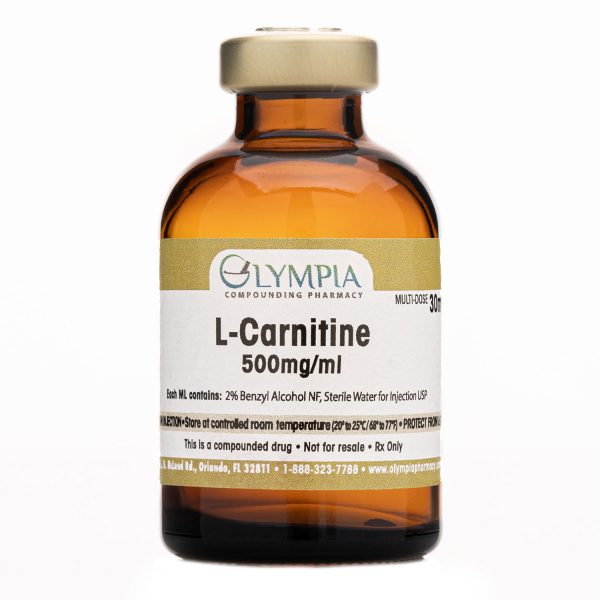
Carnitine is found in nearly all cells of the body and plays a critical role in the production of energy. It transports long-chain fatty acids into the mitochondria so they can be oxidized or burned to produce energy. Carnitine also transports toxic compounds out of the cellular organelles, preventing any accumulation. Given these functions, carnitine is concentrated in tissues that utilize fatty acids as fuel, like skeletal and cardiac muscles. For most people, the body makes enough carnitine. However, some people have genetic or medical conditions that prevent their bodies from meeting the necessary amount. This is when oral or injected supplementation is essential. Carnitine occurs in two forms: D-carnitine and L-carnitine. They are isomers (or mirror images) of each other. L-carnitine is the active form found in the body that transports fat to cells to be used as fuel in metabolic processes. D-carnitine does not occur naturally in humans. L-carnitine is synthesized in the brain, liver, and kidneys from the amino acids methionine and lysine and is critical to heart and brain function, muscle movement, and several other body processes. Insufficient carnitine can lead to problems in the liver, heart, and muscles.
Carnitine is indicated in those with cardiovascular disease, renal (kidney) insufficiency, male infertility, diabetes, muscular disease, and HIV/AIDS.
Helps turn fat into energy, which makes it an ideal supplement for fitness goals. L-Carnitine may help reduce muscle damage during resistance training.
Dosage: Seek advice from a licensed physician, medical director, or other healthcare provider
Concentration: 500mg/ml
Route of Administration: IV/IM
According to the National Institutes of Health, carnitine interacts with pivalate-conjugated antibiotics such as pivampicillin which are used in the treatment of urinary tract infections. Taking these antibiotics increases the excretion of pivaloyl-carnitine, which can lead to carnitine depletion. Carnitine also interacts with the anticonvulsants valproic acid, phenobarbital, phenytoin, or carbamazepine. Taking these have been shown to significantly decrease blood levels of carnitine. In addition, the use of valproic acid with or without other anticonvulsants may cause hepatotoxicity and increase plasma ammonia concentrations, leading to encephalopathy.
Some serious side effects may include:
Store at controlled room temperature. Protect from light.

Get your dream body now, pay later with Cherry!
Choose your payment plan before your next appointment- won’t harm your credit!

Get your dream body now, pay later with Cherry!
Choose your payment plan before your next appointment- won’t harm your credit!
7155 East Main Street, Scottsdale, AZ 85251
Phone: 602-456-9201
Text: 602-492-5736
E-mail: info@studio48medspa.com
Monday – Thursday 9:00 AM – 6:00PM
Friday: 9:00 AM – 3:30 PM
Every other Saturday: 9:30 AM – 4:00 PM
Sunday: Closed
*Studio 48 Medspa Scottsdale’s hours of operation are subject to change. Please call or book your appointment ahead of time to ensure availability. Walk – ins are welcome, but service availability is not guaranteed.